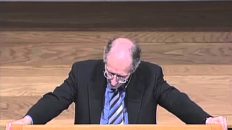One of the greatest books about God ever written, namely, John Calvin’s Institutes, begins with this sentence: “Nearly all the wisdom we possess, that is to say, true and sound wisdom, consists of two parts: the knowledge of God and of ourselves.” What we may need reminding of in our day is not that the knowledge of God is difficult to comprehend and to embrace — that’s more or less obvious — but that the knowledge of ourselves is just as difficult to comprehend and to embrace. Indeed, it may be more difficult, first, because a true knowledge of ourselves assumes a true knowledge of God, and, second, because we tend to think we do know ourselves, when, in fact, the depths of our condition are beyond our comprehension without the help of God.
Who Can Know the Human Heart?
The prophet Jeremiah wrote, “The heart is deceitful above all things, and desperately sick; who can understand it?” (Jeremiah 17:9). David said in Psalm 19:12, “Who can discern his errors? Declare me innocent from hidden faults.” In other words, we never get to the bottom of our sinfulness. If our forgiveness depended on the fullness of the knowledge of our sins, we would all perish. No one knows the extent of his sinfulness. It is deeper than anyone knows. Read More.



